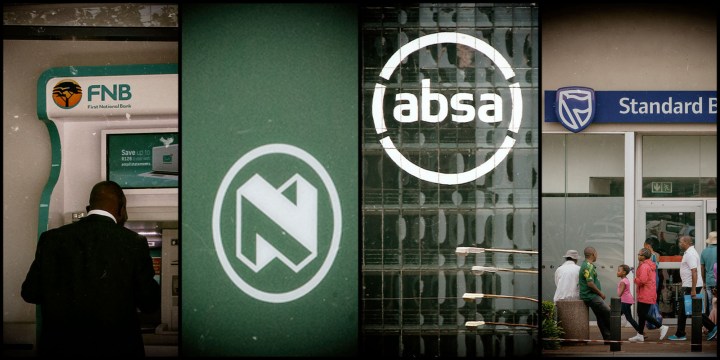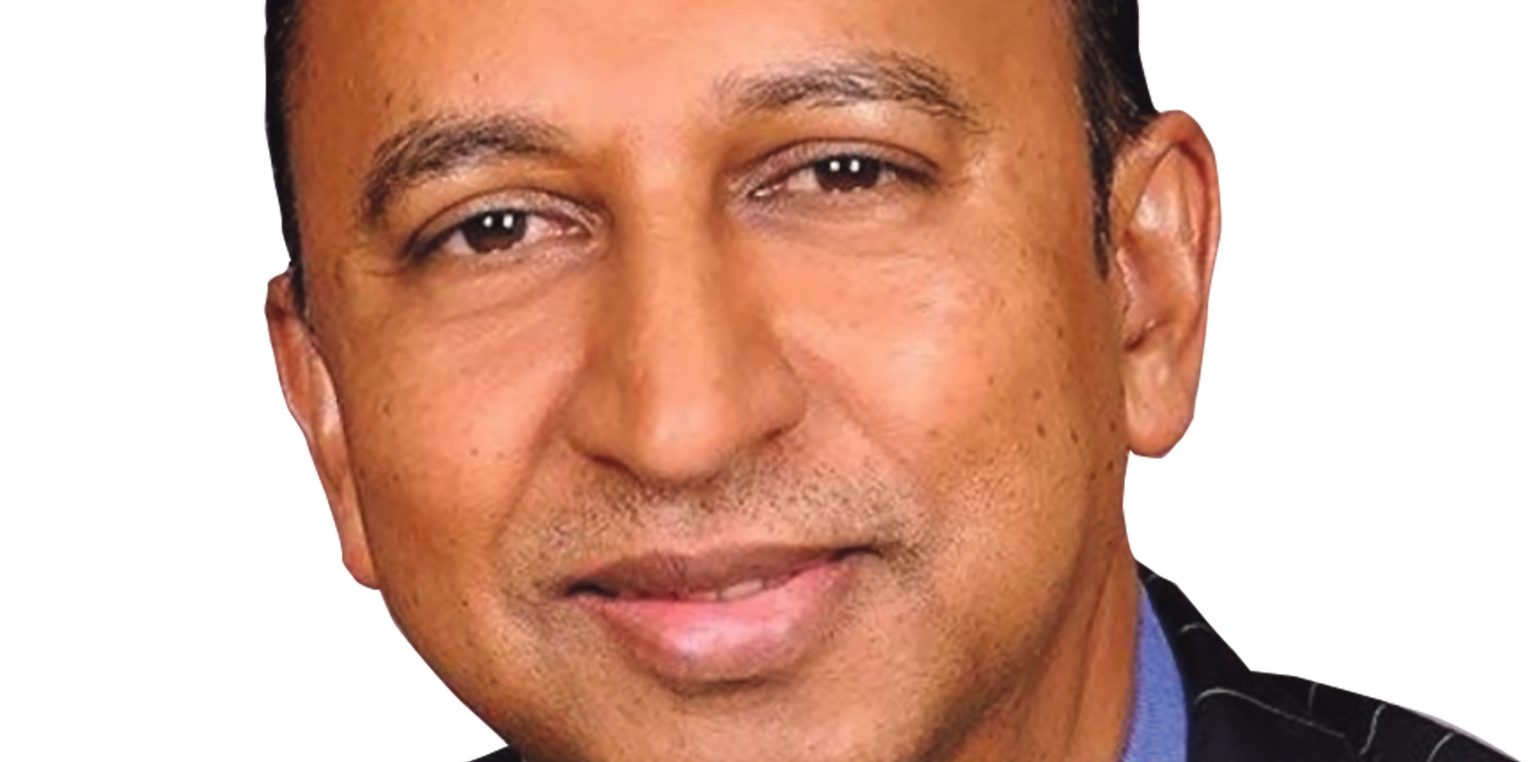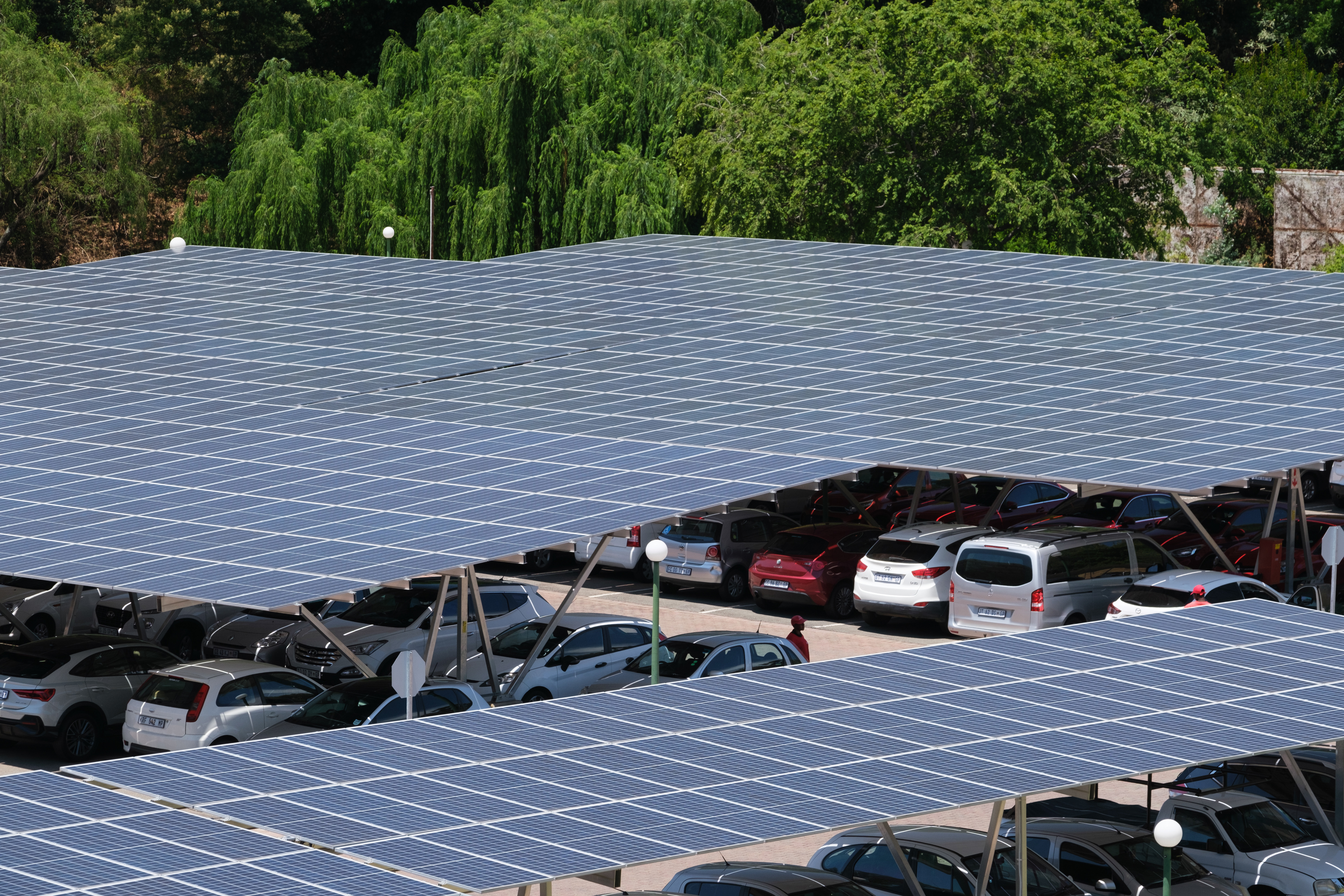POWER CRISIS
Grid collapse is ‘not probable at all’ – but banks, telecoms, health services are playing it safe

An investigation into the likely fallout from a total power failure suggests the panic might be overplayed. No one is taking any chances though.
As winter bites, rolling blackouts continue to disrupt people’s lives, affecting access to food, warmth and financial security for many. Last month, Eskom laid out a worst-case scenario for the winter, and warned of possible Stages 7 and 8 outages between June and August.
But blackouts have eased in recent days. This is largely because Eskom is doing less maintenance – as is usual in winter – but also because demand has reduced since 1 June, Eskom told Daily Maverick this week.
Another contributor to fewer blackouts is an improvement in Eskom’s energy availability factor, to 54.38% so far in June year-to-date.
Among the power utility’s key objectives this winter is to keep its unplanned capability loss factor (UCLF) at less than 15,000MW (anything higher is risky territory for higher stages of outage). Eskom said the average UCLF for June was 15,300MW.
The power utility has consistently rejected claims of an imminent grid collapse this winter, and stressed that higher stages of load shedding did not mean South Africa is at greater risk of a national blackout. Additionally, Vally Padayachee, the chairman of the National Rationalised Specifications Association of SA, said on 21 June that “a potential national grid collapse – though technically not impossible – is virtually not probable at all”.

Vally Padayachee, chairman of the National Rationalised Specifications Association of SA. (Photo: Facebook)
‘Far away from a blackout’
Padayachee added: “After all, it has not happened in South Africa in 100 years of Eskom’s existence … We have never had a total blackout in the country. So we can give you the assurance we’re far away from a blackout let alone a grid collapse.”
But both Padayachee and Eskom said higher stages of planned outages this winter could not be ruled out.
“A high demand for electricity for the remainder of winter will be determined largely by how cold weather sets in across the country in the coming weeks and what the generation capacity available will be when that occurs,” Eskom said. “While less likely, given the current performance of the Eskom generation fleet, Stage 8 load shedding is still a possibility this winter.”
Though fears of grid collapse have waned, many organisations and sectors are making contingency plans for Stage 8 cuts or worse.
Cellphone service
Leading telecommunications operators, including MTN, Vodacom, Telkom and Cell C, have joined forces to set up the Communication Risk Information Centre (COMRiC) to discuss matters affecting the industry and access to telecommunication services – including network vandalism and blackouts.
The telecoms industry consensus is that there is a slim chance of a grid collapse his winter. But COMRiC CEO Thokozani Mvelase told Daily Maverick there had been detailed discussions on the matter.
“In the basket of discussions is the eventuality of the worst happening and its impact on telecommunications,” Mvelase said.
Higher stages of blackouts are already affecting quality telecommunications services. More than 25,000 cellphone towers in South Africa help to provide mobile connectivity and internet. To fully function, the towers rely on electricity supply. In the 16 years that South Africa has been energy insecure, telecommunications operators have spent billions of rands fitting towers with batteries and generators to beat blackouts.
Cellphone towers remain fully functional for as long as the batteries last (between four and eight hours) and there is diesel to run generators. But longer blackouts do not give batteries sufficient time to recharge, resulting in cellphone towers becoming powerless and users losing their mobile signals.
Operators plan to spend more money fitting towers with more batteries and burning more diesel in the generators. MTN has set aside R1.5-billion to keep its network running. Vodacom has spent more than R4-billion on backup sources since 2020 .
Telecom operators are still trying to determine how long they can keep cellphone towers functioning during higher stages of blackouts or a grid collapse.
Guaranteed diesel supply has been a key part of their deliberations.
“A grid collapse will initially be experienced in the same way as load shedding … But as we’ve seen with stage load shedding, the towers can’t cope with repeated outages on the same day,” said Arthur Goldstuck, the founder of research firm World Wide Worx.
Backup batteries only run for up to seven hours without recharge and if electricity does not return in a grid collapse scenario cellphone towers will start failing and users will not have access to voice, mobile data, fibre, and other forms of communication.
“Fuel and diesel stocks become depleted within days. There is no guarantee from the government that companies could get diesel every two days to run generators at cellphone towers to ensure limited mobile connectivity,” one telecoms executive said. “We can plan to have over 20,000 generators but without diesel supplies during a grid collapse, they would be useless.”
Operators could collaborate, combining their diesel resources to run a few cellphone towers for limited periods.
Telecom operators are starting to instal solar panels at cellphone tower sites, but are limited by available space for panel arrays.
“The cellphone tower sites and base stations were built on the assumption of constant power security. Their design cannot handle 20 or 30 solar panels,” the executive said. Possible theft and vandalism of expensive solar panels and batteries are other factors to consider.
Telecoms’ CEOs recently urged the government to take steps to mitigate the effects of blackouts on the sector. These include increased penalties and prison sentences for economic sabotage and theft of equipment, exempting operators from competition regulations blocking them from collaborating to ease the energy crisis and introducing diesel rebates to ensure the fuel’s high cost does not unduly burden commercial operations.
Banking services
Though most organisations say national grid failure is unlikely, the SA Reserve Bank (SARB) last month told news agency Bloomberg it is working on a plan to ensure the country’s payments system remain in operation in the “unlikely” event of grid collapse.
Daily Maverick asked several banks about their preparations for grid collapse. Some declined to comment. TymeBank, largely a digibank, was the most upbeat.
Owen Sorour, TymeBank’s chief risk officer, pointed out that its banking and payments infrastructure was set up in the cloud, “in environments that are not dependent on Eskom infrastructure and that can continue to function should there be a grid collapse”.
TymeBank customers would continue to use till points at Pick n Pay and Boxer stores and cellphones to perform certain transactions, meaning TymeBank’s contingency plans will be closely aligned with retailers and cellphone companies.
“We are communicating with our retail and business partners on business continuity plans to ensure interruptions to services are limited,” Sorour said. He added that the bank’s capital adequacy ratio was in excess of 125%, with a loan-to-credit ratio of more than 3,000%, both of which are significantly above regulatory minimums.
“While a total grid collapse will increase the cost of doing business and might cause short-term inconvenience, business and banks in South Africa have shown their resilience, and an ability to adapt and resolve challenges. We are confident that continuity of service will be ensured,” Sorour said.
Nedbank declined to go into detail, merely saying management assessed readiness for various scenarios, including a prolonged outage, on an ongoing basis.
“In the unlikely event of a prolonged power outage, a broader co-ordinated response will be required from the financial services industry as a whole, and as such will be directed by the South African Reserve Bank. Since the onset of increased load shedding this year, Nedbank has put measures in place to ensure our operations continue, and many of these would continue to be implemented should there be further increases to load shedding or a prolonged outage,” it said.
Absa alluded to an industry-wide contingency forum led by the SARB to “assess and mitigate power supply risks to the financial system” – as did Standard Bank, which said it was “working closely with the Reserve Bank, other banks and key service providers to ensure appropriate levels of readiness”.
Referring to its own systems, Absa said infrastructure and critical services were supported by alternative power sources including solar, diesel and batteries. Priority-services staff are equipped with alternative power sources including uninterruptible power supply (UPS) devices.
As spelt out in its recent financial results, Absa spent R80-million on diesel in 2022 to keep infrastructure running during power cuts and estimates a further spend of R200-million this year if outages and the price of diesel remain at February levels. However, Absa warned that if outages averaged Stage 6 this year, diesel costs would accelerate to more than R350-million.
Standard Bank admitted that, though branches and ATMs have backup power supplies, “there will be instances where due to the extended nature of the outages some of these services may not be available”.

Netcare currently has 13.4MWp of solar PV installed capacity on its facilities’ rooftops and carports. (Photo: Supplied)
Public and private health services
The National Department of Health said it would do “everything possible” to ensure no hospital closed its doors or suspended its services because of rolling blackouts.
Attempts were being made to exempt health facilities from outages, it said.
Department spokesperson Foster Mohale said: “All hospitals will have enough budget to maintain and fuel the generators. This is in addition to other sources of electricity, including the UPS [systems].
“The task team established to work on modalities to fast-track exemption of facilities, comprising Eskom and health department senior managers and technical experts, is working hard around the clock.”
A Pretoria High Court ruling on 5 May ordered Public Enterprises Minister Pravin Gordhan to exempt schools, hospitals, clinics and police stations from blackouts within 60 days. Gordhan has filed for leave to appeal against the judgment.
By March, 76 hospitals had been exempted from power cuts, out of a list of 213 the Department of Health gave to Eskom for consideration.
Health Minister Joe Phaahla said the department was working with Eskom to expand the number of exempted facilities.
Emergency medical care provider ER24 has contingency plans in place, according to spokesperson Russel Meiring, and is implementing additional plans to ensure its facilities and equipment are constantly backed up and available for emergencies.
“The ER24 corporate office, as well as our numerous branches nationally, have the necessary infrastructure to enable business continuity during the different stages of load shedding. This infrastructure includes the use of generators to ensure all systems are online at all times,” he said.
Jacques du Plessis, Netcare’s hospital division boss, told Daily Maverick that, apart from an increase in energy costs, Netcare’s operations would not be affected by rolling blackouts as it had invested in backup diesel generators at all facilities more than a decade ago. Solar power was used in daylight hours and outside of outages.
“We have no option but to make provision for backup power to keep our hospitals operational. With the increasing load shedding frequency, Netcare facilities have used more than double the amount of diesel compared to previous years. The additional costs that are incurred from this increase in diesel use are not recovered from our patients or their medical schemes, and are absorbed by Netcare,” Du Plessis said.
“Netcare currently has 13.4MWp of solar PV installed capacity on its facilities’ rooftops and carports. However, these systems are grid-tied solutions and do not have battery storage included. As such, when load shedding occurs or the grid drops away, the solar systems also switch off. This is done to protect the generators from damage, given that this is the hospitals’ ultimate fallback in providing care to our patients.”
Netcare was investigating battery backup solutions to augment generators, he said.
Mediclinic’s facilities are backed up by onsite equipment, ensuring uninterrupted functioning, according to Kobus Jonck, general manager of infrastructure.
The private hospital group was investing in renewable energy, with a focus on solar, Jonck said. However, solar resources could not supply the full load for its hospitals at this stage.
Social support systems
The South African Social Security Agency (Sassa) would be affected by higher stages of rolling blackouts as not all of its offices had an alternative power supply, said Sassa spokesperson Dineo Mosete. Power supply disruptions not only interrupt Sassa operations but also affect connectivity and systems that enable online services.
“Sassa has commenced rolling out alternative power supply countrywide. The first phase commenced at the beginning of the 2023/24 financial year. For this phase, Sassa identified 90 critical local offices countrywide, 10 per region,” he said.
“The second phase will commence in the 2024/25 and 2025/26 financial years.”
An alternative power supply will be considered for each local office according to its needs, and solutions will include generators, hybrid inverters and solar power. An amount of R29-million has been allocated for this project in the 2023/24 financial year.
Prior to the current financial year, Sassa had installed alternative power in:
- 35 Limpopo offices;
- 25 North West offices;
- Four Northern Cape offices;
- 25 KwaZulu-Natal offices;
- One Gauteng office;
- 34 Eastern Cape offices; and
- The Sassa head office.
Where alternative power was not available, Sassa would rely on manual processes during outages, which might lead to backlogs and long queues at certain offices, Mosete said.
In response to questions from Daily Maverick, Department of Home Affairs spokesperson Siya Qoza said its branches had generators and the department was installing additional UPS systems.
“However, Home Affairs relies on the availability of telecommunications networks from network operators. We use these networks to send and receive information between our offices and database. Ultimately, our ability to deliver will be determined by the availability of telecommunications networking in the base stations that are near our offices or mobile offices,” he said.
Basic education
Department of Basic Education spokesperson Elijah Mhlanga said that, based on information received through appropriate channels, “we have no reason to fear grid collapse”. He added: “As the basic education sector in all provinces we do not anticipate there will be major disruptions to teaching and learning.
“Schools can continue with their business even without electricity. In those schools where electricity is needed, alternative methods of power generation would already be in place.”
In the unlikely event of a grid collapse, the biggest challenge would be traffic congestion, which would affect access to schools, he said.
Meanwhile, the department would “continue to do everything [it] can to support schools in managing the impact of load shedding, to ensure that, no matter what stage the country finds itself in, quality education can continue”. DM
This article first appeared in Daily Maverick’s sister newspaper DM168, which is available countrywide for R29.




















Comments - Please login in order to comment.